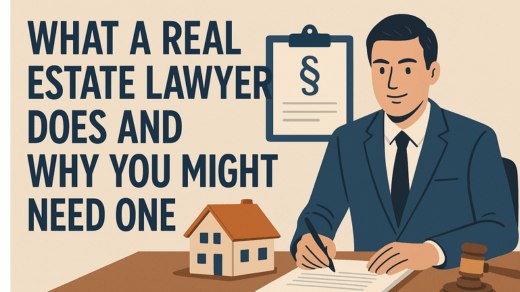Buying, selling, or investing in property can be one of the most significant decisions you make personally or professionally. While real estate agents guide you through listings and negotiations, there’s another key player you should never overlook: the real estate lawyer. These legal professionals are essential to navigating the complex world of real estate law and protecting your interests in every transaction.
From title reviews and contract negotiations to zoning disputes and landlord-tenant issues, real estate lawyers ensure that your property dealings are legally sound, financially protected, and free from avoidable risks.
What Is Real Estate Law?
Real estate law governs the ownership, use, and transfer of land and buildings. It involves legal rules that determine how property is bought, sold, developed, leased, and inherited. Whether you’re dealing with a single-family home or a multi-million dollar commercial portfolio, real estate law plays a critical role at every step.
Key areas covered under real estate law include:
- Residential and commercial property transactions
- Lease agreements and tenancy rights
- Mortgage and financing regulations
- Land use laws and zoning compliance
- Property inheritance and estate planning
- Disputes over boundaries, easements, or ownership
Because of its complexity, most buyers, sellers, and investors turn to real estate lawyers to navigate legal requirements and ensure deals close without legal surprises.
The Role of a Real Estate Lawyer
Real estate lawyers don’t just appear at the closing table. Their involvement can (and should) begin much earlier. Here’s what they typically do:
1. Due Diligence and Title Searches
They ensure the property has a clear title meaning there are no outstanding liens, encumbrances, or disputes. A lawyer will verify ownership, identify legal issues, and spot red flags before you commit.
2. Drafting and Reviewing Contracts
From purchase agreements to lease terms, real estate lawyers draft, review, and negotiate documents to protect your rights and reflect your intentions. They ensure there are no hidden clauses or unfair conditions.
3. Regulatory Compliance
Real estate transactions often involve local or national regulations. A lawyer ensures your deal complies with land use laws, environmental rules, and building codes preventing delays, fines, or costly errors.
4. Closing the Transaction
At closing, they prepare and review all legal documents, handle fund transfers, and ensure the deed is properly recorded. They make sure everything is legally binding and complete.
5. Resolving Disputes
If conflicts arise over boundaries, non-disclosure, zoning, or breach of contract a real estate lawyer represents your interests in negotiations, mediation, or court proceedings.
Do You Really Need a Real Estate Lawyer?
In some jurisdictions, using a real estate lawyer for property transactions is legally required. In others, it’s optional but strongly recommended. Here’s why:
- For Buyers: Protect yourself from fraud, unexpected liabilities, and contract traps.
- For Sellers: Ensure full legal disclosure, handle liens or disputes, and avoid post-sale claims.
- For Investors: Structure deals properly, especially if buying through a corporation or partnership.
- For Landlords: Draft enforceable leases, navigate eviction laws, and manage tenant issues.
- For Developers: Understand zoning, easements, permits, and environmental impact regulations.
Legal mistakes in real estate aren’t just inconvenient they can cost you thousands, tie up your property for years, or put your entire investment at risk.
Common Situations That Require Real Estate Legal Advice
You should consider hiring a real estate lawyer when:
- Buying or selling a property with unique terms
- Leasing or renting commercial real estate
- Entering a rent-to-own or lease-option agreement
- Developing land or applying for rezoning
- Transferring property through inheritance
- Facing a property dispute with a neighbour or government authority
- Purchasing a foreclosure, short sale, or auctioned property
- Dealing with joint ownership, divorce-related sales, or title errors
In any of these situations, a qualified real estate lawyer can provide peace of mind and prevent legal pitfalls.
Real Estate Law in a Digital World
With the rise of e-signatures, virtual viewings, and online closings, the real estate industry has become more efficient but also more vulnerable. Identity fraud, undisclosed encumbrances, and misrepresentation have become more common.
Now more than ever, buyers and sellers need real legal representation to verify the legitimacy of transactions and documents. Real estate lawyers help prevent scams and ensure that your deal digital or otherwise is legally airtight.
How to Choose the Right Real Estate Lawyer
Here are a few tips for finding a legal expert who’s right for you:
- Experience: Look for someone with proven expertise in real estate legal advice relevant to your location and property type.
- Communication: They should be responsive, transparent, and explain complex issues in plain language.
- References: Check reviews or ask for referrals from trusted professionals like your agent or accountant.
- Network: Good lawyers often work closely with surveyors, title companies, or financial advisors helpful during complex transactions.
Platforms like Leaders in Law simplify this process by connecting you with pre-vetted, experienced real estate lawyers across jurisdictions.
Final Thoughts
Buying or selling property is one of the biggest financial moves you can make and it’s filled with legal details that can be daunting without the right support. Whether it’s reviewing lease agreements, ensuring compliance with land use laws, or handling unexpected property disputes, real estate lawyers ensure every step of your transaction is clear, fair, and legally sound.
Don’t risk making decisions based on incomplete information or poor contracts. By working with a specialist in real estate law, you protect your investment, your time, and your peace of mind.
Need expert guidance? Platforms like Leaders in Law connect you with top-tier real estate lawyers around the world so your next property move is backed by legal confidence.

